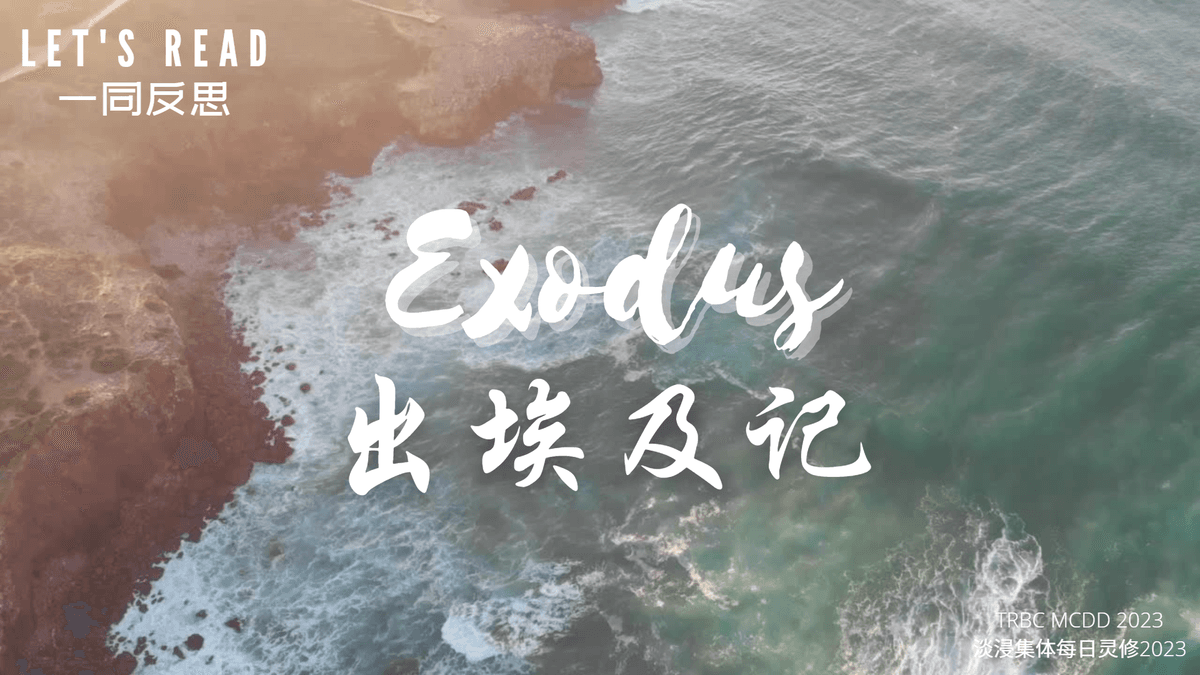Last 5 Days

God is the same in the past, the present, and the future

Click here to read Exodus 1
In the original Hebrew text of the bible, Exodus begins with the word “and”, a word that is not translated in the English version. “And” functions to join Exodus to the story that begun in Genesis, that God chose a people for himself and brought them down into Egypt. Hence, Exodus is to be read as a continuation of the past, a part of the bigger book of the Pentateuch, a part of a larger story.
Verse 7 reminds us of what was first mentioned in Genesis 1:28 and 9:1 - The Israelites became “fruitful and increased greatly; they multiplied and grew exceedingly strong”. The Israelites’ increasing number in Egypt was a sign of God’s presence and blessing. They, like their forefathers, were fulfilling the creation mandate.
However, verse 8 tells us of a new Pharaoh who came into power. He apparently did not “know” Joseph, but it could be that he was either ignorant of his own nation’s history, or he chose to be ignorant of Joseph’s wise counsel, and how the Egyptians had benefitted from it. Although some details of his reign were lacking, it was clear that this new Pharaoh was not happy with the increasing number of Israelites (v9-10). He had three solutions to keep the Israelites’ numbers to a manageable mass: (1) Enslavement (verses 11-14); (2) Kill all Israelite male children at birth (verses 15-21); (3) Murder all sons born to the Hebrews (verse 22).
Pharaoh’s actions were not just harsh measures on the Israelites, but showed his opposition to the Israelites’ fulfilment of the creation mandate to be fruitful and multiply. Hence, he was not only hostile to God’s people by enslaving them, but hostile to God Himself, who commands that His people multiply.
Although all these, in the book of Exodus, seems to show that the Israelites were suffering under a new rule, the truth is that God’s people are never alone. They belonged to God, who is Lord over creation and history. And that is what Exodus is conveying. The beginning chapters of Exodus lingered in the present situation of enslavement, and the connection to the past, by way of Genesis, suggests that the author’s intention is to show the Israelites that who they are now must be understood in connection with who came before them, and who they were.
Similarly, as Christians, as a church, our present is never separated from the past. Our present is connected to the past because of our spiritual identity in Christ. As we recount our church’s 85 years of history, we can be sure that God was with us, and will be with us, not matter what the church is experiencing. As individuals, as we go through life’s ups and downs, and perhaps even ask questions of who we are, and where do I fit in, etc, know that the God of creation and history is the Lord of your life. God is the same and He remains with His people. We can be sure of that because of the indwelling of the Holy Spirit.
Therefore, even if God’s people today, like the Israelites of Exodus 1, were to suffer, the big picture, the knowledge of our God and His commands, should not be lost. It is maintaining this big picture that is a mark of the mature Christian life. We doubt and we struggle, but we trust God. Things are not the way they ought to be, but we rest in God’s promises. We have faith. We can be certain that we are in Christ and He does not change. Our present is secure and our future is certain, and we can thank God for that.
Dear God, thank you for being the same from the beginning, and for promising to be with us. Thank you that our present is secure in you, and our future certain. In Jesus’ name I pray, Amen.
